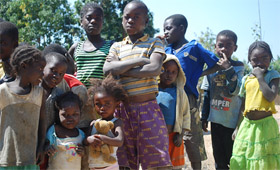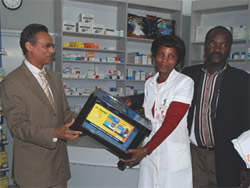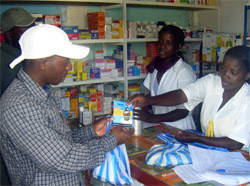Since 2006, Coartem® has been procured by PMI for distribution in Angola via the public sector.
Gilda Encarnação, known as Shakira by her eight siblings and the community, is a happy, active three-year-old girl who loves to run around and play with her older friends. One morning, her mom noticed she was not smiling as usual and, as she helped her get dressed, she realized Shakira had a high temperature. Shakira lives with her large family in a rural area in Huambo Province, where the nearest public health facility is about 10 km (six miles) away. They normally walk there, but this morning Shakira was in no condition to make the journey. Her parents thought she might have malaria. Malaria transmission is high in Huambo, and in the rural area where Shakira lives, malaria transmission rates may be even higher than in other parts of the province. Her father had heard on the radio that the most effective treatment for malaria – Coartem® – was now available at their local pharmacy for a low price of 75 kwanza ($1 U.S.). Because the pharmacy was close, Shakira’s father was able to purchase Coartem® and within 15 minutes give Shakira her first dose. The antimalarial tablets started to work quickly, and Shakira’s father was surprised at how soon after taking Coartem® she started eating and playing tag. He was relieved that Shakira was cured of the potentially deadly disease after taking the three-day treatment.

Shakira holds her teddy bear and stands with her friends and family after being treated and cured of malaria. Source: The MENTOR Initiative
Since 2006, Coartem® has been procured by PMI for distribution in Angola via the public sector. During the last two years, health care workers at more than 85 percent of existing provincial health facilities in Huambo Province have received intensive technical training on the use of artemisinin-based combination therapies (ACTs); Coartem® is an ACT. Routine support visits show that staff at more than 60 percent of health facilities are using the new ACT protocol for uncomplicated malaria.
Angolan health authorities recognize that the private sector plays an important role in providing treatment for malaria cases and may provide treatments to 40 to 60 percent of fever cases. Recent national studies showed high rates of resistance to more widely available antimalarial medications, such as chloroquine and sulfadoxine-pyrimethamine (SP), and the lack of availability of ACTs in the private sector, which are typically higher priced, posing both a great challenge and an important opportunity to increase access to effective, affordable ACTs.
In October 2008, the MENTOR Initiative received funding from PMI to assist the National Malaria Control Program (NMCP), the National Essential Drugs Program, and provincial health authorities in a pilot project in two municipalities in Huambo Province to improve accessibility and effective use of ACTs at private sector outlets and ensure the correct implementation and adherence to national strategies and protocols.

Dr. Filomeno Fortes, director of the NMCP, left, launches the distribution of Coartem® in the private sector in Huambo. Source: The MENTOR Initiative
The initial assessment of private sector pharmacies in Huambo in November 2008 showed that most antimalarial drugs being sold were monotherapies of chloroquine, quinine, SP, and amodiaquine. Monotherapies are not recommended because they contribute to the development of antimalarial drug resistance. In addition, chloroquine and SP are no longer considered effective treatments for malaria in this part of Africa. The same study reported a large range in prices, with 60 percent of non-ACT pediatric malarial treatments being sold between 50 and 200 kwanzas (approximately $.70 – 2.70 U.S.); the few ACTs that were available were more expensive. At the same time, a survey of knowledge, attitudes, and practices showed that half of the people interviewed knew that Coartem® or another ACT was the best medicine for treating malaria. However, the high price of Coartem®, which cost up to 1,500 kwanzas (around $20.00 U.S.) in the private sector, and low availability limited access to effective treatment even for those who recognize the value of ACTs.
On July 17, 2009, the distribution of ACTs to private outlets was launched. To date, 95 pharmacies in the two municipalities of Huambo and Caala are providing Coartem® at the price of 75 kwanzas ($1 U.S.) for children under 5 years of age. This price, established by the NMCP, is competitive with, if not cheaper than, the alternative monotherapies, ensuring that people have access to an affordable and effective malaria treatment. Ongoing supervision has indicated that initial results on the key outcomes of the pilot – uptake and adherence to subsidized ACTs – are promising.
Now other children, like Shakira, will have the opportunity to access effective treatment for malaria in their communities.

